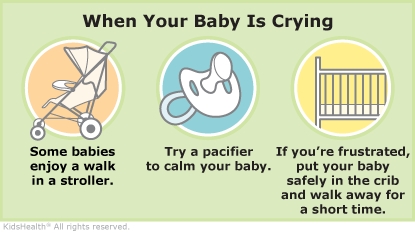Babies with colic are healthy, but cry for at least 3 hours a day on more than 3 days a week. Colic in infants is upsetting for parents, but it will go away in time. Most babies outgrow it by 3 or 4 months of age. Give yourself breaks and ask for help from friends and family when you're feeling overwhelmed.

Feeding tips:
- Avoid overfeeding your baby or feeding too quickly.
- Burp your baby often.
- If you breastfeed:
- Try different positions.
- Consider talking with a lactation specialist.
- If you bottle feed:
- Try different nipples and bottles. A bottle with a collapsible bag or liner inside can help to reduce air swallowing.
- Hold your baby in a more upright position to feed (you will need a curved bottle to do this).
Soothing tips:
- Swaddle your baby. But:
- Make sure your baby still has room to breathe and move their hips and legs inside the swaddle.
- Always place your baby on their back to sleep, even while swaddled. Watch that your baby doesn't roll over while swaddled.
- Stop swaddling when your baby is starting to be able to roll over.
- Cuddle or gently rock your baby.
- Try putting your baby in an infant swing.
- Take your baby for a walk in a stroller or a baby carrier.
- Fasten your baby in the car seat and go for a drive.
- Offer your baby a pacifier.
- Try holding your baby in an upright position to help move gas through the body. Or place your baby belly-down across your lap and rub your baby's back.
- Try singing to your baby or listening to music together.
- Try a white noise machine or app or put your baby near a fan or clothes dryer when it's running. (Never put your baby on top of the washing machine or dryer.)
- Give your baby a warm bath.
Try a few of these. If one doesn't help after a few minutes, try something else. Something may work one day and not the next.
Safety reminders:
- Never shake your baby, no matter how frustrated you feel.
- If you become frustrated, you can:
- Ask a friend or relative to watch the baby for a while. Use that time to take care of yourself — eat a healthy meal, get some exercise, or take a nap.
- Put your baby down in the crib, close the door, and go to the next room. Check on your baby every 10 minutes.
- Call 800-4-A-CHILD (800-422-4453) to talk to a counselor for free.

You are so tired or upset that you feel you might hurt yourself or your baby.

Why do babies get colic? The exact cause of colic isn't known. It might be that babies swallow air while feeding, which causes gas pains. Or babies with colic might feel overstimulated or stressed while getting used to their new environment.
Could colic be linked to diet? If soothing techniques, new bottles, and new feeding positions don't help, health care providers might recommend diet changes. This can help if the baby has a food intolerance or allergy that is causing the symptoms. If you breastfeed, try cutting certain foods out of your diet (such as spicy foods, dairy products, or caffeine) to see if it helps. If your baby takes formula, your health care provider might recommend changing to a different one. These diet changes don't always work, but can be worth trying.
Is there a test for colic? No, health care providers diagnose colic by doing an exam and by asking questions about the health of the baby and the pattern of crying.
What else can I do?
- Joining a support group for new parents can help you learn ways to deal with any challenges. Ask your health care provider about groups in your area.
- The online program "All Babies Cry" (allbabiescry.com) helps people learn how to soothe a baby and cope with crying.




